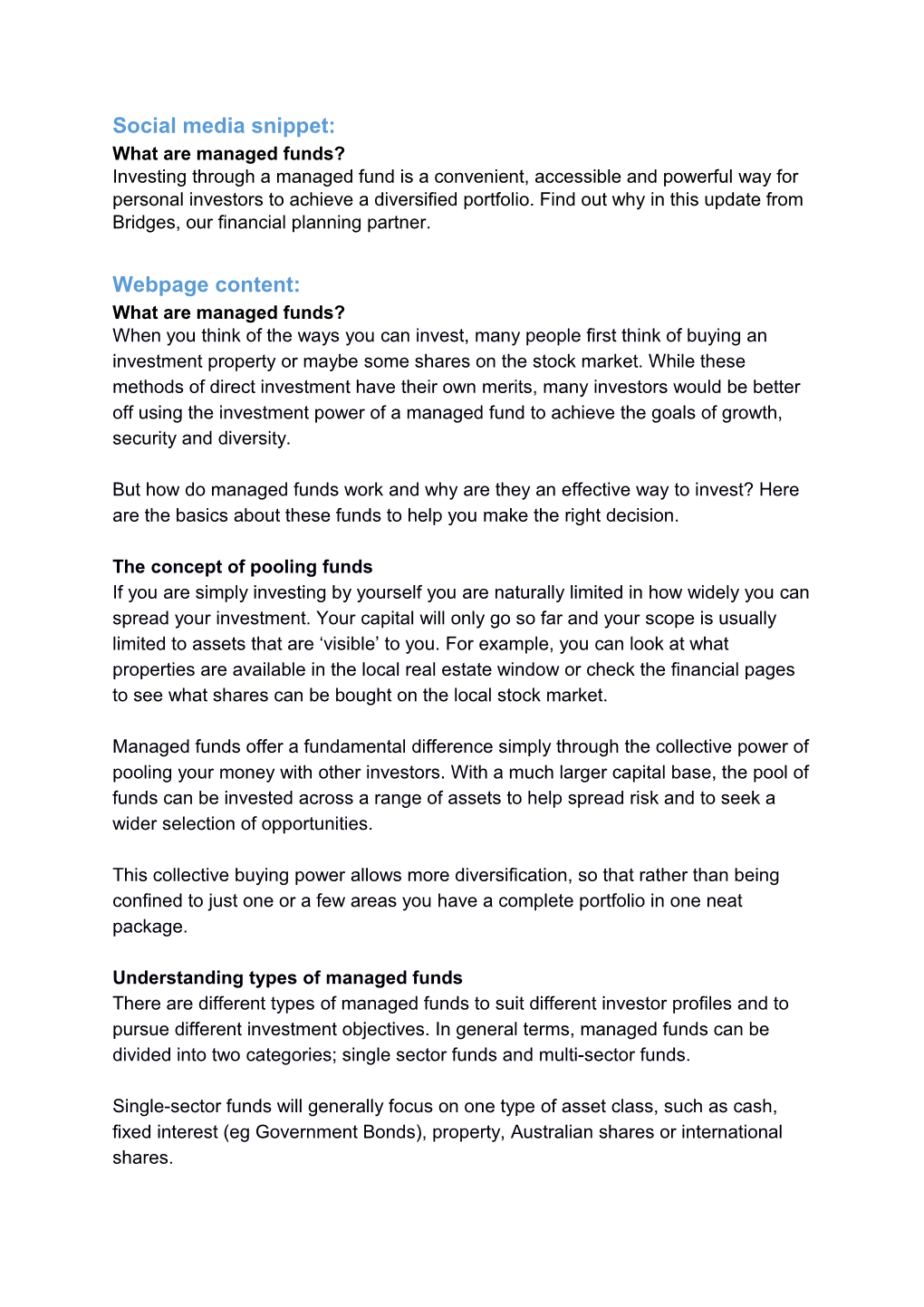Social media snippet:
What are managed funds?
Investing through a managed fund is a convenient, accessible and powerful way for personal investors to achieve a diversified portfolio. Find out why in this update from Bridges, our financial planning partner.
Webpage content:
What are managed funds?
When you think of the ways you can invest, many people first think of buying an investment property or maybe some shares on the stock market. While these methods of direct investment have their own merits, many investors would be better off using the investment power of a managed fund to achieve the goals of growth, security and diversity.
But how do managed funds work and why are they an effective way to invest? Here are the basics about these funds to help you make the right decision.
The concept of pooling funds
If you are simply investing by yourself you are naturally limited in how widely you can spread your investment. Your capital will only go so far and your scope is usually limited to assets that are ‘visible’ to you. For example, you can look at what properties are available in the local real estate window or check the financial pages to see what shares can be bought on the local stock market.
Managed funds offer a fundamental difference simply through the collective power of pooling your money with other investors. With a much larger capital base, the pool of funds can be invested across a range of assets to help spread risk and to seek a wider selection of opportunities.
This collective buying power allows more diversification, so that rather than being confined to just one or a few areas you have a complete portfolio in one neat package.
Understanding types of managed funds
There are different types of managed funds to suit different investor profiles and to pursue different investment objectives. In general terms, managed funds can be divided into two categories; single sector funds and multi-sector funds.
Single-sector funds will generally focus on one type of asset class, such as cash, fixed interest (eg Government Bonds), property, Australian shares or international shares.
Multi-sector funds will spread across a range of these asset classes and will normally target a certain risk/return profile by having a weighting toward certain types of assets. The weighting will normally be indicated by a term such as ‘growth funds’, which invest predominantly in shares and property; ‘conservative funds’, which lean toward less volatile assets like fixed interest; and ‘balanced funds’, which are somewhere in between.
Profit from specialised skills
Another benefit of pooling your investment through a managed fund is that you gain access to the investing expertise of a fund manager. A fund manager will also have a range of skilled personnel with skills in researching, analysing and allocating the pool of money to achieve the fund’s stated objective.
Investors can leverage this expertise to achieve a significant advantage in the quality of assets chosen, in contrast with having to do all the research and asset selection yourself.
But what about the cost?
The level of skill, buying power and convenience that managed funds offer will, of course, involve some cost to the investor.
While you may think twice about whether such fees are worth it, remember that an investment that you buy into directly, such as an investment property or company share, will still involve some form of cost. Buying an investment property, for example, will involve legal fees, stamp duty and inspection costs. Buying shares directly will incur brokerage costs.
Choosing a fund to suit you
If you are interested in the benefits of a managed fund, then a financial planner can help you assess the type of fund that suits you by making an assessment of your specific lifestyle objectives, time horizon and risk appetite.
Bridges Financial Services Pty Ltd (Bridges). ABN 60 003 474 977. ASX Participant. AFSL 240837.
This is general advice only and has been prepared without taking into account your particular objectives, financial situation and needs. Before making an investment decision based on this information, you should assess your own circumstances or consult a financial planner or a registered tax agent.
Examples are illustrative only and are subject to the assumptions and qualifications disclosed.
Part of the IOOF group
Additional disclaimer for referral partners:
In referring customers to Bridges, <insert referral partner name> does not accept responsibility for any acts, omissions or advice of Bridges and its authorised representatives.
